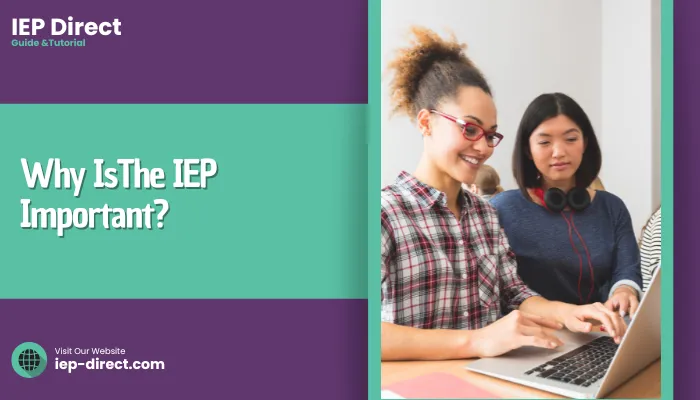Have you thought why is the IEP important? Understanding IEP Direct guide is very important for anyone involved in a child’s education, especially if that child has special needs.
An Individualized Education Program (IEP) is a legally binding document that specifies a student’s specific learning, developmental, and functional needs. It serves as their roadmap to realize their full potential as disabled children.
Therefore, we will dig down this topic in deep and will understand what goes behind the seance of it.

Why Is The IEP Important: A Closer Examination
Now we will know why Is The IEP Important because any person who parents, teaches, or learns in respect of people with mental disabilities should know about it.
An individualized education program (IEP) forms an integral part of special education by serving as an individualized plan for students’ school activities.
Therefore, IEP plays an very important in planning for students.
Unique Learning
Many people may still think why is the IEP important because that its existence guarantees each student with disabilities gets something suitable to them cannot be overemphasized. Every student is unique and this calls for an IEP that offers a personalized learning plan.
Personalized Goals
Each student has measurable goals to ensure that they are challenged and supported accordingly.
Accommodation and Modification
These adjustments include modifications made by adapting teaching methods or materials in order to enable students with disabilities to achieve maximum access to the general curriculum within schools.
Additional Services
For example, speech therapy, occupational science support services, or counseling can be identified here.
For this reason, the IEP provides individualized learning strategies, measurable targets, required modifications and extra services in order to make sure every disabled student gets the help they require to achieve their maximum potential.
Compliance Requirements
This is not optional, it’s a mandatory educational provision under the Individuals with Disabilities Education Act (IDEA). It ensures every disabled child receives free appropriate public education (FAPE).
Parental Rights
IDEA also gives parents certain legal rights, such as being members of the team which evaluates and develops the child’s individual educational program or consent given before implementing such an IEP.
Liability
A school can protect itself from litigation by adhering to the IEP system.
Hence, it is of utmost importance to comply with the Individuals with Disabilities Education Act (IDEA). It guarantees every disabled child’s access to free appropriate public education (FAPE), grants parental rights, and protects schools from any liability through the IEP system.
Strategies for Inclusion
An IEP is a tool that enhances inclusion in schools. If students with disabilities are provided with necessary support services, they will be able to actively participate in the general education curriculum.
Least Restrictive Environment (LRE)
It values educating children with disabilities together with non-disabled ones (mainstreaming).
Overcoming Obstacles
The student’s unique needs are addressed by this plan which makes learning possible and creates a classroom that is more inclusive.
In conclusion, an IEP is crucial for fostering inclusion in schools. By providing necessary support services and ensuring a Least Restrictive Environment (LRE), it allows students with disabilities to actively participate and overcome obstacles, creating a more inclusive classroom.
Personalized Educational Objectives
A major advantage of an IEP is that it gives students personalized educational objectives. These are usually made to suit the student’s individual strengths, weaknesses, and requirements.
Personalized Approach
In contrast to conventional classrooms where instruction is sometimes one-size-fits-all, with IEP each pupil gets his or her own tailored education.
Measurable Goals
Goals for IEPs are explicit, definite, and measurable thus allowing for easy tracking of a student’s progress.
Individual Strengths
Building confidence and motivation is possible through a focus on the child’s strengths in an IEP.
In summary, an IEP offers personalized educational objectives, a tailored education, and measurable goals, focusing on each student’s individual strengths. This approach builds confidence and ensures effective progress tracking.
Special Instruction and Services
Additionally, an IEP guarantees that students receive specialized instruction and services they need to succeed.
Specialized Teachers
Students with hearing impairments often have access to specially trained teachers who have expertise in addressing their specific needs.
Related Services
Other than classroom teaching activities, speech therapy, occupational therapy, or physical therapy may be some of the related services incorporated within the IEPs.
Assistive Technology
If necessary, the use of assistive technology can be outlined by an IEP to help students reach curriculum content.
In conclusion, an IEP ensures students receive specialized instruction, related services like speech therapy and occupational therapy, and assistive technology, all tailored to support their success and unique needs.
Tracking Progress
Another critical part of an Individual Education Program (IEP) is monitoring progress at regular intervals. This ensures that there has been substantial growth as regards what was expected from the learner.
Data Driven Decisions
By keeping track of a student’s progress, educators can make decisions based on data regarding instructional strategies and interventions.
Adjustments
The goals may be adjusted or additional support given if required when a student is struggling with their work as per their Individualized Education Programs (IEPs).
Celebrating Success
Moreover, monitoring progress enables the celebration of achievements which boost the morale of students.
Therefore, An IEP enables these students to reach their maximum potential through personalized learning goals, specialized support, and ongoing progress monitoring.
The Significant Role of Parents and Educators
However, when it’s come to why is the IEP important because it is critical to delve into the role played by parents and educators in ensuring that such plans are successful.
The significant role are as follow:
Collaboration And Communication
IEP is a team effort that requires open communication between parents and teachers for its success.
Shared Goals
For instance, both parents and educators have a similar ultimate goal which is to assist the student to succeed.
Open Dialogue
Constant channels of communication should exist whereby information about how a student is doing is shared as well as their challenges and strengths.
Mutual Respect
It is important to build trust on mutual respect for effective collaboration.
In summary, collaboration and communication between parents and educators are essential for a successful IEP, ensuring shared goals and mutual respect.
Advocacy and Support
If you are thinking why is the IEP important then it is because of parents who play an essential role in representing their child’s needs in society, ensuring their unique requirements are met through the IEP.
To make you understand properly two table has been shown so that you can see the difference yourself.
| Understanding the IEP | Details |
|---|---|
| Parents Must Take Time | Parents must take time to understand all about an IEP including its implications. |
| Active Participation | It is crucial that parents attend meetings where Individualized Education Programs (IEPs) are made and participate actively while making decisions. |
| Seeking Support | Seek support from other parents, advocacy groups, or legal professionals if needed. |
| Educators Should | Details |
|---|---|
| Provide Information | Teachers must be clear when providing information regarding learners’ progress and any concerns. |
| Listen Actively | Value parents’ input and perspectives. |
| Offer Support | Provide materials that help parents understand the IEP and implement it at home. |
Therefore, they create an optimum learning atmosphere for the students if they work together as parents and educators.
Conclusion
Everything about why is the IEP important has been answered, it is more than just a piece of paper; it’s a map that guides you through life. By understanding the IEP and working together, parents, educators, and students can create a positive and supportive learning environment.
Ultimately, the IEP is an instrument of empowerment where full potential can be realized by learners, advocacy can be done by parents effectively while the best instruction shall be provided by educators.
Through prioritizing the IEP we are investing in our children’s future.
